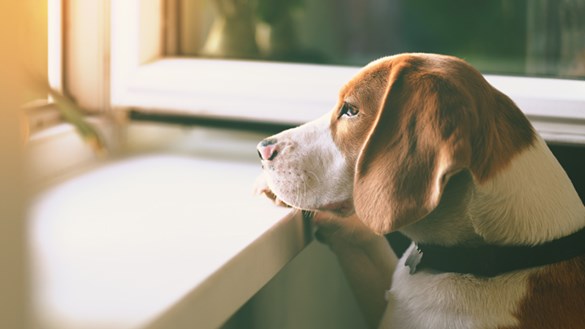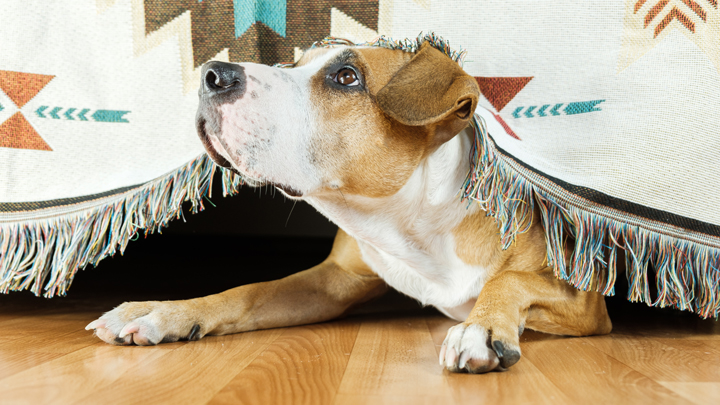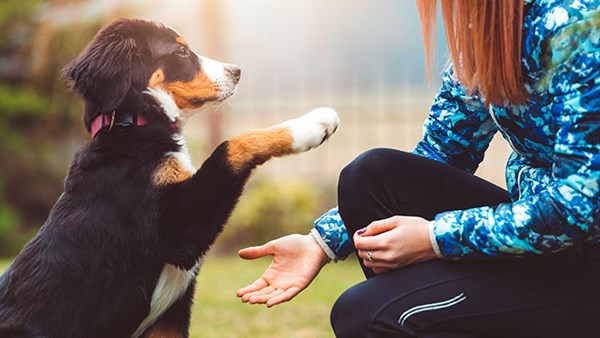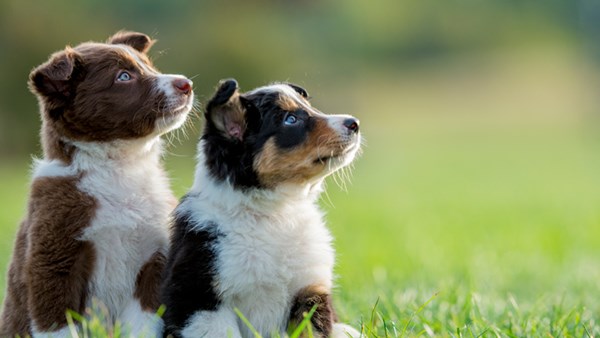Separation Anxiety In Dogs
Dogs are social creatures and many experience separation anxiety when left alone. Learn how to spot the signs and how you can help.

The sharp increase in dog-ownership during the Covid lockdowns and the possibility of a return to a new-normal, where there’s not always somebody at home with your dog, means that you need to recognise that separation anxiety may become an issue.
Dogs are very social and often don’t enjoy spending time alone. They love attention and require plenty of human companionship. Given half a chance many dogs would be with their ‘best friend’ 24/7.
For a dog that struggles with time alone, separation anxiety can be very distressing. It can also have a knock-on effect on other areas of their life; this can be perceived as bad behaviour, but separation anxiety is the root cause.
Lockdown-life means that many puppies are used to there always being somebody about and for older dogs, they’ve got used to there always being somebody home.
What is separation anxiety?
Separation anxiety is when a dog becomes anxious and distressed when they’re left alone. It’s a behavioural issue that can be very upsetting for even the most confident dogs.
It’s common in puppies and also in dogs where the behaviour hasn’t been noticed and then managed from a young age. It’s often mistaken for mischievousness. This then becomes the norm and people think they just have a naughty dog; this is generally not the case.
In severe cases, you should consult a dog behaviourist, as it’ll interfere with your dog’s health and wellbeing.
What does my dog do?
There are many signs of separation anxiety and these will vary depending on each individual dog, how long they’re left for, where they’re left, and many other factors. A dog suffering from separation anxiety may display one or more of these signs:
- Whining, howling or barking
- Chewing or destroying furniture, walls, your belongings
- Pacing around the room or around the house
- Panting and heavy breathing with an increased heart rate
- Messing or weeing around the house
- Following you around (especially if you look like you're going out)
If you want to understand more about what your dog does when you’re not home, it’s fairly easy to set-up a small camera and record them. If this has a voice functionality too, you could use this as a way to try and calm them down, should they start to get agitated.
Why does my dog have separation anxiety?
The main reason is that your dog misses you. As nice as this is, it’s important to recognise that it’s happening because your dog is upset. It may also be because they’re scared about something that happened recently, perhaps in the home. A change of routine (lockdown life changing), boredom, your dog’s personality and life experience will also play a part.
In a small number of cases, your dog may be in pain. If you think that this could be the case, please talk to your vet.
The routine change that many households have experienced as part of the Covid lockdown will almost certainly impact many puppies and dogs. Over the last 12 months, everything so much about our everyday lives has changed, and in many households there has been somebody around all the time. Your dog will have loved this, but things are starting to change and it’s important to recognise that this will affect your dog.

How can I help my dog?
The most important thing is that you recognise the difference between separation anxiety and bad behaviour. Praise and reward the good rather than punishing the bad. Imagine your dog spends hours missing you and being anxious, you arrive home, they’re thrilled to see you and then you get upset at what they’ve done, and they see they’ve disappointed you.
The key is to understand how long your dog can be left alone for; it will be longer for some than others. Once you understand this, you can try and work around it. Is it possible for a friend or neighbour to pop in briefly and make sure your dog is okay? Can you employ a dog-walker to break up the day for them? Is doggy day care an option? It’s becoming increasing popular, so there’s high demand – always conduct thorough research before entrusting your dog to a third party.
Ensure that your dog has access to food and fresh water and that they have enough toys around to keep themselves entertained. Some dog’s like to have the radio or TV on for a bit of company.
Make sure that the room or rooms that your dog has access to in your absence are safe. For example, if they like to jump at the window to see when you’re coming home, it’s a good idea to keep this clear of things that they could knock over in their excitement.
If there’s a change of routine, recognise that this will need to be managed slowly. Covid lockdown is a great example of this; if you know that in the next few weeks your dog is going to be alone more. Get them used to this gradually, rather than just changing it overnight and your dog getting a huge shock.
Is it different with a puppy?
If you have a new puppy, it’s a good idea to start getting them used to short periods of time alone from an early age. This may just be leaving them in a separate room, and with toys to encourage them to self-entertain. Don’t forget to reward them when they do this well and be patient when they don’t, it will take time.
If you're crate-training, then practice the same sort of thing with a reward when they get it right, this will encourage repeat behaviour. As well as rewards, It’s important to be calm and consistent in your approach.
Gradually build up the time that your puppy is left alone, rather than immediate long periods of time, where you leave the house. The way that you manage this in your puppy’s early months, will be key to the development of a healthy happy dog that is able to cope without you beside them the whole time.
How long can my dog be left for?
There are many factors that will affect this, such as the nature of your dog, the age of your dog, and the location of where they're left.
For a very young puppy, a maximum of a couple of hours. For an adult dog around 4 hours should be manageable.
Wherever possible, enlist the help of a friend, a neighbour or a local dog-walker to break the day up. You should never leave your dog alone overnight; this will be very frightening for them and could lead to other behavioural issues.
You should also never leave your dog outside. The recent and alarming rise in dog theft is a real concern for dog owners. Never leave your dog outside whilst you leave the house, this presents a golden opportunity for thieves and is also not great for your dog as the weather can be a bit hit and miss. Read more on dog theft.
If you think your dog may be suffering with separation anxiety, talk to your vet for advice on how you can help them.




